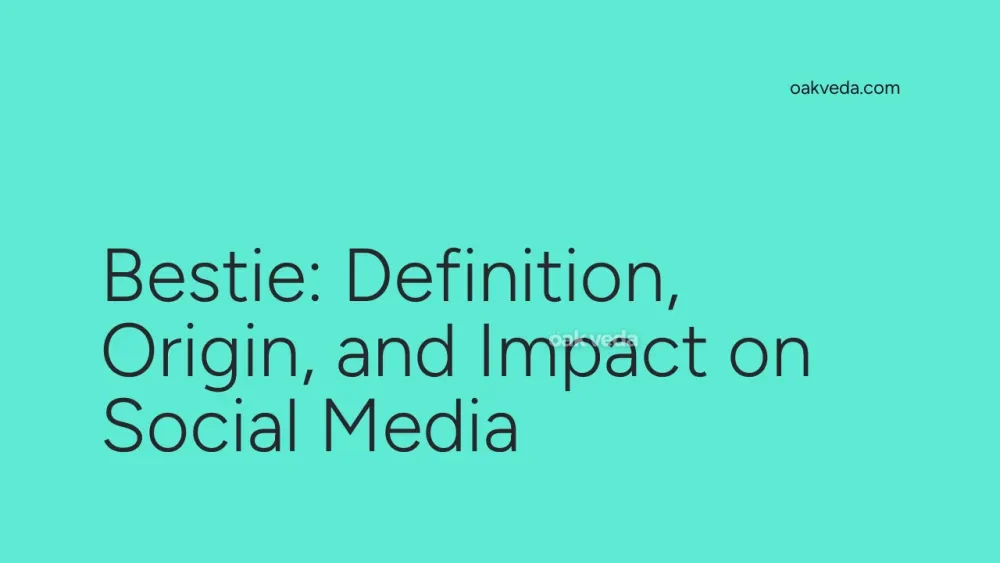
What is Bestie?
"Bestie" is a popular slang term used in social media and everyday conversation to refer to one's best friend. It's an affectionate and informal way of addressing or describing someone who is considered a person's closest and most trusted friend. The term has gained significant traction in digital communication, particularly among younger generations, and has become a staple in social media lexicon.
Origin and Development of Bestie
The term "bestie" is derived from the word "best," specifically from the phrase "best friend." While the exact origin is difficult to pinpoint, it gained popularity in the early 2000s as internet slang and text messaging became more prevalent. The suffix "-ie" is often added to words to create a more endearing or informal version, similar to other terms like "selfie" or "foodie."
As social media platforms emerged and grew, "bestie" found its way into posts, comments, and captions, cementing its place in digital communication. Its widespread use on platforms like Instagram, Twitter, and TikTok has contributed to its mainstream acceptance and integration into everyday language.
How Bestie Works in Social Media
On social media, "bestie" serves multiple purposes:
- Captions: Users often use "bestie" when posting photos with close friends, e.g., "Night out with my bestie! 🎉"
- Comments: It's common to see "bestie" in supportive or affectionate comments on friends' posts.
- Direct messages: Friends might address each other as "bestie" in private conversations.
- Hashtags: #BestieGoals or #BestieAdventures are popular for showcasing friendship moments.
- Memes and trends: "Bestie" is often incorporated into viral content and challenges.
The term creates a sense of intimacy and closeness in digital spaces, helping users express affection and strong bonds in a playful, informal manner.
Types or Variations of Bestie
While "bestie" is the most common form, several variations have emerged:
- Beastie: A playful twist, often used for friends who are particularly energetic or wild.
- Bestest: An exaggerated form emphasizing an even closer friendship.
- Bestie for the restie: Implying a lifelong friendship ("for the rest of our lives").
- Bestie vibes: Used to describe a situation or atmosphere that feels like hanging out with a best friend.
These variations allow users to add nuance and personality to their expressions of friendship on social media.
Popular Examples of Bestie Usage
- Celebrity friendships: Celebrities often use "bestie" to refer to their famous friends, creating buzz and relatability.
- Influencer collaborations: Social media influencers frequently use "bestie" when creating content together, fostering a sense of community with their audience.
- Brand campaigns: Companies have incorporated "bestie" into marketing strategies to appear more approachable and youth-friendly.
- Viral challenges: Many TikTok and Instagram challenges involve best friends, often using "bestie" in their titles or descriptions.
Impact of Bestie on Social Media Culture
The prevalence of "bestie" on social media has had several notable impacts:
- Friendship visibility: It has made close friendships more visible and celebrated online.
- Language evolution: "Bestie" exemplifies how internet slang can quickly become mainstream.
- Inclusivity: The term is often used regardless of gender, promoting a more inclusive language around friendships.
- Emotional expression: It provides a casual yet affectionate way to express closeness in a digital context.
- Community building: The term helps create a sense of intimacy and in-group feeling among social media users.
How Brands and Influencers Use Bestie
Brands and influencers have capitalized on the popularity of "bestie" in several ways:
- Relatable content: Using "bestie" in posts to seem more approachable and friendly.
- Product pairings: Marketing complementary products as "besties" (e.g., "Coffee and donuts: breakfast besties").
- Engagement strategies: Encouraging followers to tag their "besties" in posts to increase reach and interaction.
- Influencer partnerships: Collaborating influencers often refer to each other as "besties" to strengthen their perceived relationship.
Future Trends Related to Bestie
As social media continues to evolve, we can expect:
- New variations: The term may spawn new, platform-specific variations.
- AI integration: Chatbots and AI assistants might adopt "bestie" to seem more friendly and relatable.
- Virtual reality: As VR social spaces grow, "bestie" could take on new meanings in virtual friendships.
- Global adoption: The term may increasingly cross language barriers, becoming a universal social media expression.
FAQs about Bestie
-
Is "bestie" only used by younger generations? While more common among younger users, people of all ages use "bestie" on social media.
-
Can you have multiple "besties"? Yes, many people use "bestie" for several close friends, though some reserve it for a single best friend.
-
Is using "bestie" appropriate in professional settings? It's generally considered too informal for professional contexts and is best reserved for personal communication.
-
How has "bestie" affected friendship dynamics on social media? It has made friendships more visible and celebrated online, but can also create pressure to publicly display close relationships.
-
Is "bestie" used equally across all social media platforms? While widespread, its usage may vary. It's particularly popular on visually-oriented platforms like Instagram and TikTok.
In conclusion, "bestie" has become a significant part of social media language, reflecting the importance of friendships in online spaces. Its widespread use demonstrates how digital communication continues to shape language and social interactions in the modern world.
You may be interested in:
- Flex: Definition, Origin, and Impact on Social Media
- Share of Voice (SOV): Definition, Origin, and Impact
- AMA (Ask Me Anything): Definition, Origin, and Impact
- Creator Marketplaces: Definition, Origin, and Impact
- Vibe Check: Definition, Origin, and Impact on Social Media
- Camp in Social Media: Definition, Origin, and Impact

